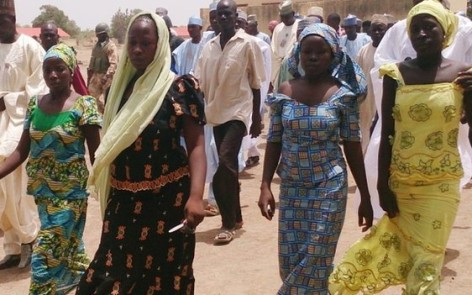Kidnapped Nigeria school girls reportedly sold as brides to Islamic Boko Haram militants
Daily News Article — Posted on May 5, 2014
(from CBS News) AP, LAGOS, Nigeria — Scores of girls and young women kidnapped from a school in Nigeria are being forced to marry their Islamic extremist abductors, a civil society group reported Wednesday.
Parents say the girls are being sold into marriage to Boko Haram militants for 2,000 naira ($12), Halite Aliyu of the Borno-Yobe People’s Forum told The Associated Press. She said the parents’ information is coming from villagers in the Sambisa Forest, on Nigeria’s border with Cameroon, where Boko Haram is known to have hideouts.
“The latest reports are that they have been taken across the borders, some to Cameroon and Chad,” Aliyu said. It was not possible to immediately verify the reports.
The Nigerian government needs to get international help to rescue the more than 200 missing girls kidnapped in the northeast by the Boko Haram terrorist network two weeks ago, said a federal senator for the area in northeastern Nigeria. The government must do “whatever it takes, even seeking external support to make sure these girls are released,” Sen. Ali Ndume said. “The longer it takes the dimmer the chances of finding them, the longer it takes the more traumatized the family and the abducted girls are.”
About 50 of the kidnapped girls managed to escape from the captors in the first days after their abduction, but some 220 remain missing, according to the principal of the Chibok Girls Secondary School, Asabe Kwambura. They are between 16 and 18 years old and had been recalled to the school to write a physics exam.
 The mass kidnapping came hours after a massive explosion in Abuja, the capital in the center of the country, killed at least 75 people and wounded 141.
The mass kidnapping came hours after a massive explosion in Abuja, the capital in the center of the country, killed at least 75 people and wounded 141.
The failure to rescue the girls is a massive embarrassment to Nigeria’s government and the military, already confronted by mounting criticism over its apparent inability to curb the 5-year-old Islamic uprising despite having draconian powers through an 11-month state of emergency in three northeastern states covering one-sixth of the country.
The military trumpets a success in its “onslaught on terrorists” but then the extremists step up the tempo and deadliness of their attacks. More than 1,500 people have been killed in the insurgency so far this year, compared to an estimated 3,600 between 2010 and 2013.
Jonathan, who is from the predominantly Christian south of Nigeria, has been accused of insensitivity to the plight of people in the north, who are mainly Muslims.
The military’s failure to rescue the girls also highlights that large parts of northeastern Nigeria remain beyond the control of the government. Until the kidnappings, the air force had been mounting near-daily bombing raids since mid-January on the Sambisa Forest and mountain caves bordering Chad.
Aliyu said that in northeastern Nigeria “life has become nasty, short and brutish. We are living in a state of anarchy.”
She was among the women who marched in Abuja on Wednesday (April 30) to protest the failure to rescue the kidnapped girls.
From an April 30 AP news story. Reprinted here for educational purposes only. May not be reproduced on other websites without permission from CBS News. Visit the website at cbsnews .com.
Background
From a May 2 Reuters report: "U.S. offers to help Nigeria in hunt for 200+ abducted girls"
- The U.S. said on Thursday it had offered to help Nigeria in its search for around 200 girls abducted by Islamist militants from a school in the northeast of the West African country.
- "We have been engaged with the Nigerian government in discussions on what we might do to help support their efforts to find and free these young women," State Department spokeswoman Marie Harf told a daily briefing. "We will continue to have those discussions and help in any way we can."
- Gunmen suspected to be from the radical Islamist movement Boko Haram on April 14 stormed an all-girls secondary school in the village of Chibok, in Borno state, packed the teenagers onto trucks and disappeared into a remote area along the border with Cameroon.
- The kidnapping occurred the same day a bomb blast, also blamed on Boko Haram, killed 75 people on the edge of the capital, Abuja, and it marked the first attack on the capital in two years.
- But the brutality of the school attack has shocked Nigerians long accustomed to hearing about atrocities in an increasingly bloody five-year-old Islamist insurgency in the north. Boko Haram is now seen as the main security threat to Africa's leading energy producer.
- Harf did not elaborate on the kind of assistance Washington is offering, but said: "We know Boko Haram is active in the area and we have worked very closely with the Nigerian government to build their capacity to fight this threat."
- Separately, a group of U.S. senators introduced a resolution condemning the abduction and urging U.S. government assistance in the rescue effort.
- "The U.S. and the international community must work with the Nigerian government to ensure these girls are reunited with their families and deepen efforts to combat the growing threat posed by Boko Haram," said Senator Chris Coons of Delaware, the chairman of the Senate's African Affairs subcommittee, and one of the resolution's six sponsors.
- In fiscal year 2012, the U.S. provided over $20 million in security assistance to Nigeria, part of that to build the country's military, boost its capacity to investigate terrorist attacks and enhance the government's forensic capabilities, she said.
